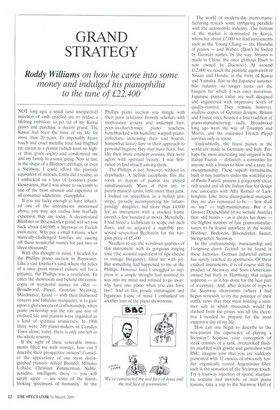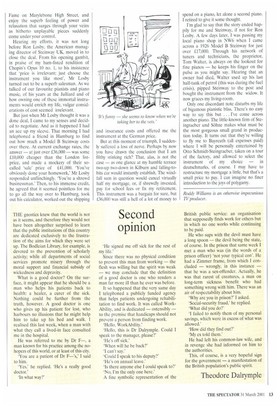GRAND STRATEGY
Roddy Williams on how he came into some
money and indulged his pianophilia to the tune of £22,400
NOT long ago, a small (and unexpected) injection of cash enabled me to realise a lifelong ambition: to get rid of my Kawai piano and purchase a decent grand. The Kawai had been the bane of my life for more than 20 years. Its impossibly heavy touch and cruel metallic tone had blighted my career as a pianist (which went no higher than grade eight) and condemned me and my family to a sonic gulag. Now at last, in the shape of a Bliithner, perhaps, or even a Steinway, I could afford the pianistic equivalent of steroids. Little did I realise, as I embarked on a tour of London's piano showrooms, that I was about to succumb to one of the most unusual and expensive of all consumer addictions; pianophilia.
If you are lucky enough to have inherited one of the instruments mentioned above, you may not realise how fearfully expensive they are today. A decent-sized Bliithner or Bosendorfer grand will set you back about £40,000; a Steinway or Fazioli even more. Why pay a small fortune, when musically-challenged families are casting off these wonderful names for just two or three thousand?
With this thought in mind, I headed for the Phillips piano auction in Bayswater. Like a vast knacker's yard, where the relics of a once great musical culture sell for a pittance, the Phillips was a revelation. To enter the showroom and behold the cornucopia of wonderful names on offer — Broadwood, Pleyel, Grotrian Steinweg, Shiedmayer, Erard — with their fruitwood veneers and fabulous marquetry, is to gaze upon a glorious era of craftsmanship, when piano ownership was the sine qua non of civilised life and pianists were regarded as a kind of spiritual aristocracy. In 1900 there were 200 piano-makers in Camden Town alone; today, there is only one left in the whole country.
If the sight of these venerable instruments filled me with wonder, how can I describe their prospective owners? Consider the appearance of our most distinguished pianists: Alfred Brendel; Mitsuko Uchida; Christian Zimmerman. Noble, sensitive, intelligent, these — you will surely agree — are some of the finestlooking specimens of humanity. At the Phillips piano auction you mingle with their poor relations: frowsty scholars with ' moth-eaten jerseys and unkempt hair; poor-as-church-mice piano teachers, hunchbacked with humility; waspish pianocollectors, increasing their vast hoards. Somewhat laissez-faire in their approach to personal hygiene they may have been, but, like their more eminent cousins, they were aglow with spiritual beauty. I was honoured to find myself among them.
The Phillips is not, however, without its drawbacks. A hellish cacophony fills the room as dozens of pianos are played simultaneously. Many of them are, in purely musical terms, little more than junk. I looked on speechless as a bullish pinstripe, proudly accompanying his 'infantprodigy' daughter, bid more than £4,000 for an instrument with a cracked frame (worth a few hundred at most). Mercifully, I had hired a technician to scope out such flaws, and so acquired a superbly preserved seven-foot Bechstein for the bargain price of £5,400
Needless to say, the wondrous qualities of this instrument, with its gorgeous zinging tone (the acoustic equivalent of ripe cheese or vintage Burgundy), filled me with joy. But something had happened to me at the Phillips. However hard I struggled to suppress it, a simple thought had wormed its way into my mind and refused to go away: why have one piano when you can have two? And in this grossly extravagant and bigamous frame of mind I embarked on another tour of the piano showrooms.
The world of modern-day piano-manufacturing reveals some intriguing parallels with the automobile industry. The bottom of the market is dominated by Korea, where for about £7,000 we find instruments such as the Young Chang — the Hyundai of pianos — and Weber. (Don't be fooled by German names, by the way: Strauss is made in China; the once glorious Ibach is now owned by Daewoo.) At around £12,000 we reach the pianistic equivalent of Nissan and Honda, in the form of Kawai and Yamaha. Just as the Japanese automobile industry no longer turns out the bangers for which it was once notorious, Japanese pianos today are well designed and engineered with impressive levels of quality-control. They remain, however, soulless copies of German designs. Britain and France once boasted a fine tradition of piano-manufacturing; sadly, Broadwood long ago went the way of Triumph and Morris, and the esteemed French Pleyel survives only in name.
Undoubtedly, the finest pianos in the world are made in Germany and Italy. Perhaps the most interesting and original is the Italian Fazioli — definitely a contender for anyone with a bonus to blow and a taste for oneupmanship. These superb instruments, built in tiny numbers under the watchful eye of Paolo Fazioli, possess a gorgeously clear, rich sound and all the Italian flair for design one associates with Alfa Romeo or Lamborghini. Like these distinguished marques, they are also rumoured to be — how shall we say? — high-maintenance. But it is Grosser Deutschland (if we include Austria) that still boasts — as it always has done — the highest number of fine piano-manufacturers to be found anywhere in the world: Bliithner, Bechstein, Bbsendorfer, Sauter, Steingraeber, Steinway.
In the craftsmanship, musicianship and Vorsprung durch Technik to be found in these factories, German industrial culture has surely reached its apotheosis. Of these exalted instruments, it is of course still the product of Steinway and Sons (Americanowned but built in Hamburg) that reigns supreme — as it has done for the best part of a century. And, after dozens of trips to the Steinway showrooms (where I had begun seriously to try the patience of their staff), news that they were holding a summer sale in which thousands would be slashed from the prices was all the incentive I needed to prepare for the most expensive day of my life.
How can one begin to describe to the non-pianist the experience of playing a Steinway? Suppose your conception of steak consists of a rank, overcooked flashfry marbled with gristle and garnished with BSE; imagine now that you are suddenly presented with 12 ounces of obscenely tender, organically reared Argentinian fillet: such is the sensation of the Steinway touch. Try a fourway injection of speed, marijuana, cocaine and steroids; or start piano lessons, take a trip to the Steinway Hall of Fame on Marylebone High Street, and enjoy the superb feeling of power and relaxation that surges through your veins as hitherto unplayable pieces suddenly come under your control.
Hearing my efforts, it was not long before Ron Losby. the American managing director of Steinway UK, moved in to close the deal. From his opening gambit, in praise of my ham-fisted rendition of Chopin's Opus 10 no. 1, to his insistence that 'price is irrelevant; just choose the instrument you like most', Mr Losby turned out to be a superb salesman. As we talked of our favourite pianists and piano music, of his years at the Julliard and of how owning one of these immortal instruments would enrich my life, vulgar considerations of cost seemed irrelevant.
But just when Mr Losby thought it was a done deal, I came to my senses and decided to negotiate. And as it happened I had an ace up my sleeve. That morning I had telephoned a friend in Hamburg to find out how much a Model B Steinway costs over there. At current exchange rates, the answer — at just over £36,000 — was some £10,000 cheaper than the London listprice, and made a mockery of their socalled 'sale' price of £41,000. 'You've obviously done your homework,' Mr Losby responded unflinchingly. 'You're a shrewd businessman.' Then, to his immense credit, he agreed that it seemed pointless for me to go all the way over to Hamburg, took out his calculator, worked out the shipping
and insurance costs and offered me the instrument at the German price.
But at this moment of triumph, I suddenly suffered a loss of nerve. Perhaps by now you have drawn the conclusion that I am filthy stinking rich? That, alas, is not the case — as one glance at my humble terrace two-up two-down in Kilburn and falling-tobits car would instantly establish. The windfall sum in question would cancel virtually half my mortgage, or, if shrewdly invested, pay for school fees or fix my retirement. This instrument was a bargain for sure, but £36,000 was still a hell of a lot of money to spend on a piano, let alone a second piano. I retired to give it some thought.
I'm glad to say that the story ended happily for me and Steinway, if not for Ron Losby. A few days later, I was passing my local piano shop in NW6 when I came across a 1926 Model B Steinway for just over £17,000. Through his network of tuners and technicians, the proprietor, Tom Walter, is always on the lookout for fine pianos — he keeps his finger on the pulse as you might say. Hearing that an owner had died, Walter used up his last half-tank of petrol (this was during the fuel crisis), pipped Steinway to the post and bought the instrument from the widow. It now graces my living-room.
Only one discordant note disturbs my life of bigamous pianistic bliss. There's no easy way to say this but . . I've come across another piano. The little-known firm of Steingraeber und Sane makes what must be the most gorgeous small grand in production today. It turns out that they're willing to fly me to Bayreuth (all expenses paid) where I will be personally entertained by Otto Schmidt-Steingraeber, taken on a tour of the factory, and allowed to select the instrument of my choice — in deutschmarks, of course. I may have to restructure my mortgage a little, but that's a small price to pay. I can imagine no finer introduction to the joys of polygamy.
Roddy Williams is an otherwise impecunious TV producer.



























































































 Previous page
Previous page